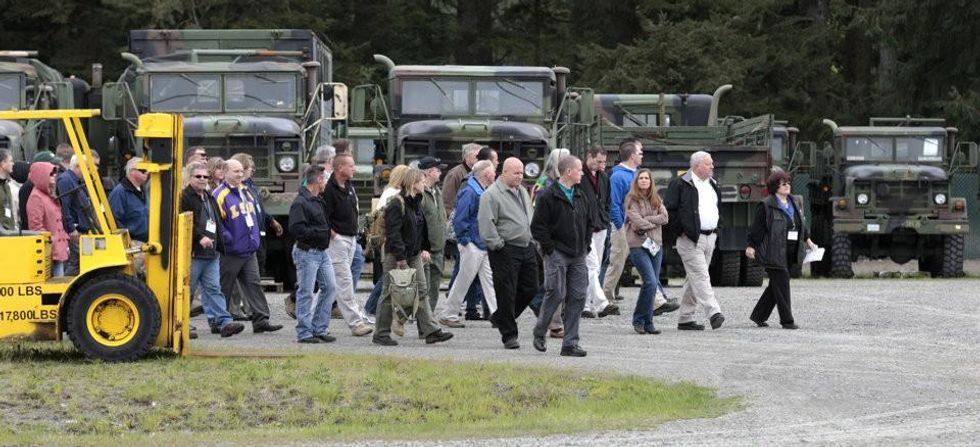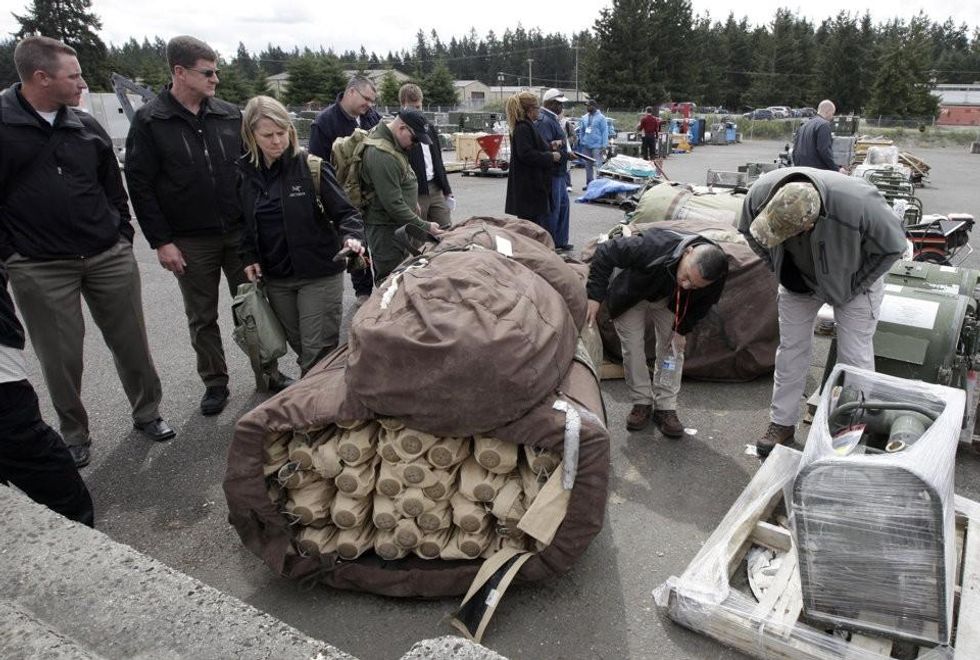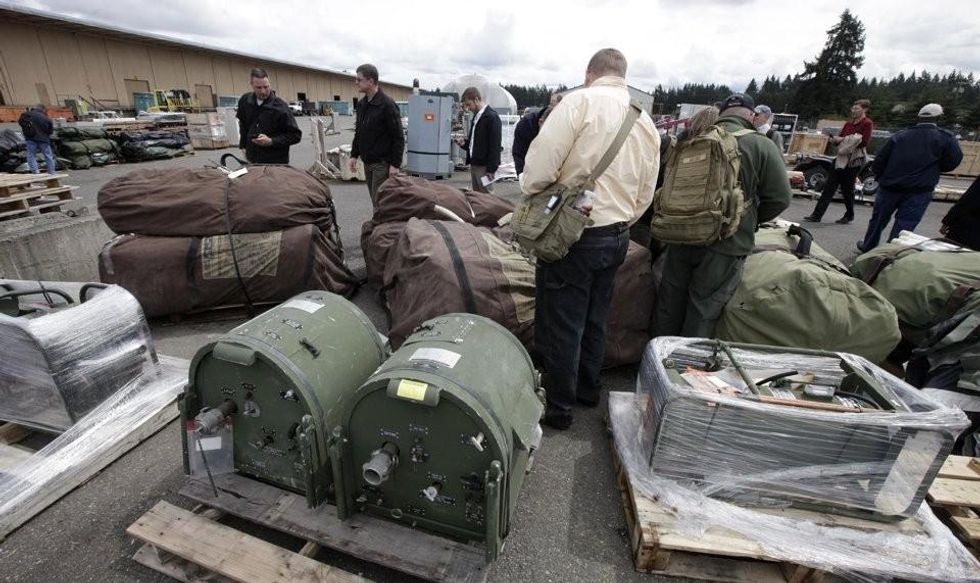Military Garage Sale Transforms Small Town to SWAT
AP investigation highlights abuse and scant oversight of military giveaways

Small town municipalities are gifted Defense Department goody-bags with the often-troubling result of transforming local police departments into military police states, according to an Associated Press investigation of this national giveaway.
The report describes a number of absurd examples such as police chiefs with closets full of bayonets, treadmills, hammocks, meat slicers and army-issue gym shorts. More pointedly, however, are the small-town stockpiles of munitions and armored vehicles which have effectively transformed many local police departments into "paramilitary forces."
Police Chief Lynwood Yates, of the 700-person town of Morven, Ga., told AP that he "formed a SWAT team, arming it with surplus military rifles, a Humvee and an armored personnel carrier."
They continue:
Yates said he could "take my guys and the training they have, the equipment we have, and we could shut this town down" and "completely control everything." Seeking to avoid "over-policing" the population and giving the appearance of "an occupying army," the chief said he's had some of the military equipment painted non-military colors.
"The harm for me is that it further militarizes American law enforcement," said retired Seattle police chief, Norm Stamper, in response to the report. "We make a serious mistake, I'm convinced, in equipping domestic law enforcement, particularly in smaller, rural communities, with this much military equipment."
The report goes on to cite some of the abuses of the program--known as the 1033 Program after a section of the National Defense Authorization Act that permits the transfer to law enforcement agencies of military property--which have led to firearms distribution being temporarily suspended until October:
A sheriff in Bureau County, Ill., was accused of lending government-issued M-14 rifles to unauthorized friends. The firearms manager for the program in North Carolina pleaded guilty in April to stealing M-14 and M-16 assault rifles and other weapons, selling some on eBay for more than $30,000.
Through interviews and analysis of thousands of emails and other documents, AP reveals a system that--because of "staffing shortages and budget constraints"--provides scant oversight of the $4.2 billion in military swag distributed since 1990.
According to their report, "a disproportionate share" has been "obtained by police departments and sheriff's offices in rural areas with few officers and little crime." Nearly 13,000 police agencies in all 50 states and four U.S. territories participate in the freebie grab.


_____________________
An Urgent Message From Our Co-Founder
Dear Common Dreams reader, The U.S. is on a fast track to authoritarianism like nothing I've ever seen. Meanwhile, corporate news outlets are utterly capitulating to Trump, twisting their coverage to avoid drawing his ire while lining up to stuff cash in his pockets. That's why I believe that Common Dreams is doing the best and most consequential reporting that we've ever done. Our small but mighty team is a progressive reporting powerhouse, covering the news every day that the corporate media never will. Our mission has always been simple: To inform. To inspire. And to ignite change for the common good. Now here's the key piece that I want all our readers to understand: None of this would be possible without your financial support. That's not just some fundraising cliche. It's the absolute and literal truth. We don't accept corporate advertising and never will. We don't have a paywall because we don't think people should be blocked from critical news based on their ability to pay. Everything we do is funded by the donations of readers like you. Will you donate now to help power the nonprofit, independent reporting of Common Dreams? Thank you for being a vital member of our community. Together, we can keep independent journalism alive when it’s needed most. - Craig Brown, Co-founder |

Small town municipalities are gifted Defense Department goody-bags with the often-troubling result of transforming local police departments into military police states, according to an Associated Press investigation of this national giveaway.
The report describes a number of absurd examples such as police chiefs with closets full of bayonets, treadmills, hammocks, meat slicers and army-issue gym shorts. More pointedly, however, are the small-town stockpiles of munitions and armored vehicles which have effectively transformed many local police departments into "paramilitary forces."
Police Chief Lynwood Yates, of the 700-person town of Morven, Ga., told AP that he "formed a SWAT team, arming it with surplus military rifles, a Humvee and an armored personnel carrier."
They continue:
Yates said he could "take my guys and the training they have, the equipment we have, and we could shut this town down" and "completely control everything." Seeking to avoid "over-policing" the population and giving the appearance of "an occupying army," the chief said he's had some of the military equipment painted non-military colors.
"The harm for me is that it further militarizes American law enforcement," said retired Seattle police chief, Norm Stamper, in response to the report. "We make a serious mistake, I'm convinced, in equipping domestic law enforcement, particularly in smaller, rural communities, with this much military equipment."
The report goes on to cite some of the abuses of the program--known as the 1033 Program after a section of the National Defense Authorization Act that permits the transfer to law enforcement agencies of military property--which have led to firearms distribution being temporarily suspended until October:
A sheriff in Bureau County, Ill., was accused of lending government-issued M-14 rifles to unauthorized friends. The firearms manager for the program in North Carolina pleaded guilty in April to stealing M-14 and M-16 assault rifles and other weapons, selling some on eBay for more than $30,000.
Through interviews and analysis of thousands of emails and other documents, AP reveals a system that--because of "staffing shortages and budget constraints"--provides scant oversight of the $4.2 billion in military swag distributed since 1990.
According to their report, "a disproportionate share" has been "obtained by police departments and sheriff's offices in rural areas with few officers and little crime." Nearly 13,000 police agencies in all 50 states and four U.S. territories participate in the freebie grab.


_____________________

Small town municipalities are gifted Defense Department goody-bags with the often-troubling result of transforming local police departments into military police states, according to an Associated Press investigation of this national giveaway.
The report describes a number of absurd examples such as police chiefs with closets full of bayonets, treadmills, hammocks, meat slicers and army-issue gym shorts. More pointedly, however, are the small-town stockpiles of munitions and armored vehicles which have effectively transformed many local police departments into "paramilitary forces."
Police Chief Lynwood Yates, of the 700-person town of Morven, Ga., told AP that he "formed a SWAT team, arming it with surplus military rifles, a Humvee and an armored personnel carrier."
They continue:
Yates said he could "take my guys and the training they have, the equipment we have, and we could shut this town down" and "completely control everything." Seeking to avoid "over-policing" the population and giving the appearance of "an occupying army," the chief said he's had some of the military equipment painted non-military colors.
"The harm for me is that it further militarizes American law enforcement," said retired Seattle police chief, Norm Stamper, in response to the report. "We make a serious mistake, I'm convinced, in equipping domestic law enforcement, particularly in smaller, rural communities, with this much military equipment."
The report goes on to cite some of the abuses of the program--known as the 1033 Program after a section of the National Defense Authorization Act that permits the transfer to law enforcement agencies of military property--which have led to firearms distribution being temporarily suspended until October:
A sheriff in Bureau County, Ill., was accused of lending government-issued M-14 rifles to unauthorized friends. The firearms manager for the program in North Carolina pleaded guilty in April to stealing M-14 and M-16 assault rifles and other weapons, selling some on eBay for more than $30,000.
Through interviews and analysis of thousands of emails and other documents, AP reveals a system that--because of "staffing shortages and budget constraints"--provides scant oversight of the $4.2 billion in military swag distributed since 1990.
According to their report, "a disproportionate share" has been "obtained by police departments and sheriff's offices in rural areas with few officers and little crime." Nearly 13,000 police agencies in all 50 states and four U.S. territories participate in the freebie grab.


_____________________

